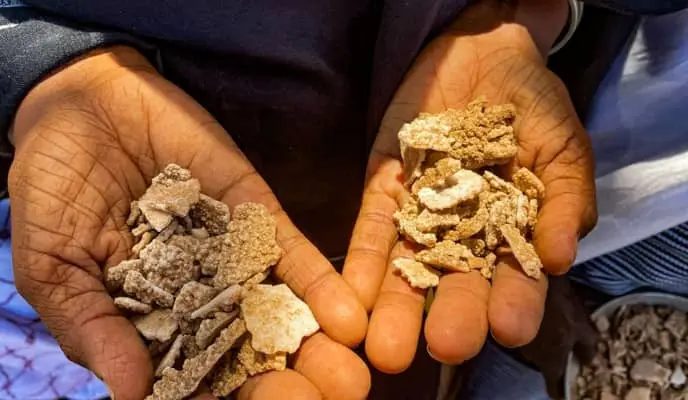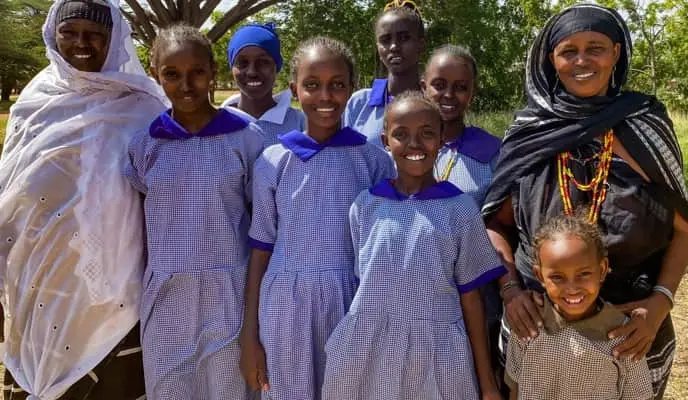The Chalbi desert was once part of an extensive lake in northern Kenya. At around 38,600 square miles (slightly bigger than the state of Indiana), it's aptly named: In Borana, the language spoken by the Gabra people who live in this region, "Chalbi" means "bare and salty."
When the rain comes, the desert fills with shallow water and is frequented by wildlife including ostriches, zebras, and even spotted hyenas. But when the rain disappears, the endless stretch of desert provides a unique opportunity for the nomadic Gabra tribe: It exposes desert salt. This salt provides essential nutrients for livestock. But not everyone has access to it, especially those living in the hills where Kenya borders Ethiopia. This is where the Chalbi Salt Self-Help Group comes in.
Worth their salt
A group of 15 women embark on a two-day trip to collect salt from the desert, which is 12 miles way. They then sell the salt to local farmers and herders, who either mix it with water or let their animals lick it in its pure form. This salt provides a great source of income for these hard-working women, not only to buy food for their families but to also pool their income together into a Village Savings and Loans Association (VSLA) so that they can all invest in a better future.

Not all women can get access to banks or credit, which is a substantial barrier to escaping extreme poverty. With a VSLA, this group can do so on their own. Every Monday, the group meets and each member contributes 200 Kenyan shillings (a little under $2.00). They then lend a part of this savings to a woman who needs some extra funds for her business (such as seeds) or her family (such as an unforeseen medical expense). The money is paid back with a modest interest rate that is also added to the savings box and used to help the next woman who needs it, thereby continuing the cycle of support.
But it doesn’t stop there.
"The girl is the final judge now"
“We’re supporting girls’ education so they don’t fall behind,” says Doke, a member of the group. “If you educate a girl child and she pursues well in her studies, she will get somewhere. She not only supports her family, but the entire community can benefit.”
The Chalbi Salt Self-Help Group puts some of their profits towards supporting girls' education in the area, recognizing that an education key in helping the next generation build a pathway out of poverty. One of the biggest barriers to education for girls is early marriage. Children can be "booked" for marriage as early as two years old, but Doke says the power in the Gabra community is shifting.
“An educated girl can decide who she wants to marry… If she says no, then it’s off. The girl is the final judge now,” says Doke, who is also challenging symbolic inequalities: In the traditional Gabra clothing, the beads each woman wears represent which clan she belongs to, whether she’s married or not, and if she has a son. However, Doke wants girls to be seen as being of equal importance to boys:
“This is a cultural symbol of how we recognize a boy child, but the girl child is not recognized. So we are fighting for the right of the education of a girl child, so they will bring us all to an equal level.” So far, the Chalbi Salt Self-Help Group has supported ten girls in their community, aged 11-14, by providing uniforms, exercise books and pens.
The challenges of climate
As a natural resource, desert salt is (naturally) unreliable. During the rainy season, it completely dissolves, leaving nothing behind. Members of the group recall one time getting caught in the rain while returning home with 100 bags of salt, their hard work put to waste without any shelter. Doke says she and the group began to panic during the long rainy season.

In response to this, Concern provided the funding needed to keep the Chalbi Salt group afloat through the season. A cash grant of 25,000 Kenyan shillings (approximately $225) helped to cover the lost income. We also led agricultural and business trainings with skills that the group members could use in periods of increasingly erratic weather in northern Kenya, where the climate crisis is being felt acutely. "We could have closed down, because there was nothing," says Doke. This would have not only impacted their families, but also the students they were sponsoring.
With the money left over, Doke and her group savvily invested in other non-weather-dependant businesses, such as buying and selling clothes. Having weathered the storm, the group are now back on their feet and making exciting plans for more future investments, such as a vehicle to transport the salt quickly and safely. For now, though, their ambition and determination to support local women and girls shines through every step of their 12-mile journey.
Concern in Kenya
Concern has spent nearly two decades in Kenya, working both in urban contexts of Nairobi and rural communities such as Doke's to address the causes of poverty in each community. Last year, we worked with 74 communities to achieve self-sustaining livelihoods and lives, meaning that they no longer need to rely on us for support.

